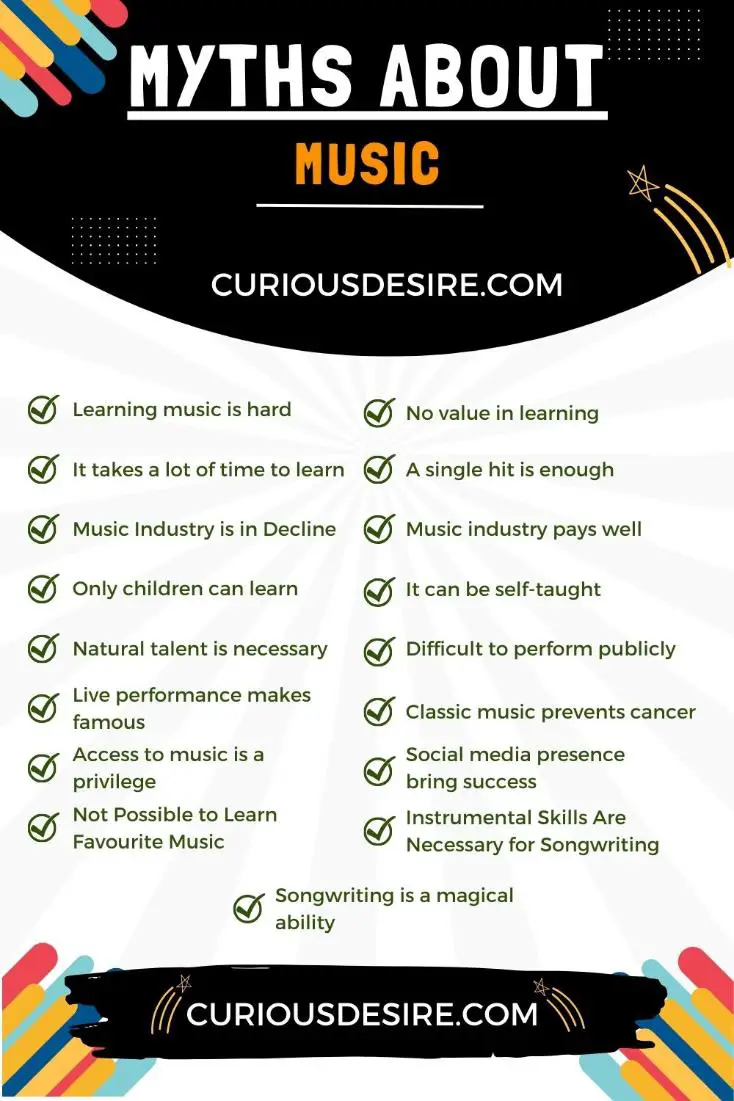Music has a profound and lasting impact that is felt deeply and harmoniously by people across different cultures. It has no language barrier. From ancient rituals to today’s streaming era, its popularity knows no bounds.
However, as melodies play, myths linger. This article will talk about myths about music peeling away layers to reveal the truths.
5 Most Common Myths about Music:
- There’s No Value in Learning Music
- Natural Talent is a Must
- The Music Industry Always Pays Well
- Classical Music Prevents Brain Cancer
- Songwriting is an Innate Magical Ability

Myth 1: I’m Too Busy for Regular Practice
Why is it Believed:
The belief that one is too busy for regular music practice often stems from the fast-paced nature of modern life. Many individuals juggle work, family, and social commitments, leading to the perception that dedicating time to daily practice is impractical.
There’s a common misconception that musical proficiency requires long, uninterrupted hours of practice, which can be challenging to fit into a busy schedule.
Moreover, the view that only full-time musicians can excel promotes the belief that casual learners with packed schedules won’t benefit significantly.
Busting the Myth:
Quality of practice is more crucial than quantity. Short, focused practice sessions can be highly effective, allowing individuals to make progress even with limited time.
Integration of music into daily routines, such as practicing during short breaks or incorporating musical exercises into daily activities, makes consistent practice more manageable.
By understanding that practice can be flexible and tailored to one’s schedule, individuals can overcome the belief that they are too busy for regular musical development.
Myth 2: I Won’t Get to Learn the Music I Enjoy
Why is it Believed:
This myth often arises from a perception that music education is rigid and limited to traditional or classical genres.
Many people may have had experiences where music lessons focused on specific genres, leading them to believe that they won’t have the opportunity to explore the music they genuinely enjoy.
Limited awareness of the diversity in music education programs contributes to this belief. It’s a common misconception that formal music education might not cater to contemporary or niche genres.
Busting the Myth:
Music education today is highly adaptable and can be tailored to individual preferences. Many music teachers and programs recognize the importance of catering to diverse musical tastes, including pop, rock, jazz, electronic, and various cultural genres.
Personalizing lessons to incorporate preferred genres not only makes learning enjoyable but also ensures that individuals can express themselves through the music they love.
Modern music education embraces a wide spectrum of styles, fostering creativity and a deeper connection with the art.
Myth 3: There’s No Value in Learning Music
Why is it Believed:
Some individuals may perceive music as merely a hobby or a form of entertainment with no tangible, practical value.
The emphasis on STEM (Science, Technology, Engineering, and Mathematics) fields in education can contribute to the misconception that pursuits in the arts, including music, lack real-world applicability and value.
Misunderstanding of the broader benefits beyond skill acquisition, such as cognitive development, emotional expression, and social connections also leads to this widely held belief.
Busting the Myth:
The value of music education extends far beyond playing an instrument or singing.
Research indicates that musical training enhances cognitive abilities, including improved memory, attention, and problem-solving skills.
Music also fosters emotional intelligence, discipline, and creativity. Additionally, the collaborative nature of music-making promotes social skills and teamwork. Recognizing these broader benefits emphasizes the substantial value of learning music.
Myth 4: Music Lessons are Only For Children
Why is it Believed:
The perception that music lessons are exclusively for children often arises from traditional views associating music education with school programs and extracurricular activities for younger individuals and it’s too late for adults to start learning.
Adults may feel that they’ve missed the window of opportunity for learning music or may experience self-consciousness about starting a new endeavor later in life.
Busting the Myth:
Music lessons are beneficial for individuals of all ages. Adult learners often bring a unique set of qualities, such as discipline and life experience, to their musical journey.
Many renowned musicians began their musical pursuits in adulthood, emphasizing that it’s never too late to start. Adult learners can achieve significant proficiency and derive immense personal satisfaction from their musical endeavors.

Myth 5: I Can Teach Myself Without a Teacher
Why is it Believed:
The belief that self-teaching is sufficient may emerge from the accessibility of online tutorials, instructional videos, and learning resources.
Some individuals possess a high level of self-confidence in their ability to acquire new skills independently, assuming that formal instruction is unnecessary for learning an instrument or mastering musical concepts.
Busting the Myth:
While self-learning has its merits and possibilities, a skilled teacher offers valuable guidance, personalized feedback, and structured lesson plans.
A teacher can identify and correct mistakes, provide tailored advice, and ensure a well-rounded education. Furthermore, formal instruction fosters a deeper understanding of music theory and technique, accelerating the learning process.
Myth 6: Natural Talent is a Must for Musical Success
Why is it Believed:
Cultural narratives often romanticize the idea of innate talent as the key determinant of the musical success of any person. Media stories focusing on genius and exceptional talent contribute to the misconception that those without inherent musical gifts cannot excel in the field.
This belief may downplay the importance of hard work, dedication, and consistent practice.
Busting the Myth:
While natural talent can provide a head start, sustained success in music is more often the result of persistent effort and practice.
Many accomplished musicians achieved their level of proficiency through years of dedicated learning and honing their craft. Recognizing that hard work and perseverance can surpass raw talent encourages aspiring musicians to focus on continuous improvement.
Diligent practice and dedication often outweigh natural talent. Many successful musicians attribute their success to persistent effort.
Myth 7: I’m Not Good Enough to Perform Publicly
Why is it Believed:
Fear of judgment, perfectionism, and comparison with professional musicians contribute to the belief that one must attain flawless proficiency before performing publicly.
The misconception that an audience expects perfection can create anxiety, stopping individuals from showcasing their musical talents.
Individuals may underestimate their abilities and feel they are not good enough to share their musical talents with an audience.
Busting the Myth:

Myth 8: Learning Music is Too Hard For Me
Why is it Believed:
The perception that music is too difficult is due to the complexity of musical notation and theory, particularly for beginners.
Impatience and frustration during the initial stages of learning may contribute to the belief that mastering an instrument or understanding music is an insurmountable challenge.
Comparing one’s skills with those of proficient musicians can also create a sense of inadequacy.
Busting the Myth:
The Suzuki method, used in music education worldwide, emphasizes the importance of starting with simple pieces and gradually progressing to more complex compositions. This approach enables learners to build skills progressively, fostering a sense of accomplishment.
Many successful musicians began with fundamental principles and gradually progressed, highlighting that the learning process is gradual and achievable with persistence. With perseverance, skills improve.
Myth 9: Enough Live Gigs Will Lead to Discovery
Why is it Believed:
This myth often arises from an oversimplified view of success in the music industry. Some individuals believe that frequent live performances alone will attract attention and lead to discovery by record labels or influential figures.
There may be a misconception that talent alone, showcased through live gigs, is sufficient for gaining recognition. Success stories of artists who were discovered at live gigs, especially in the past, may contribute to the belief.
Busting the Myth:
While live performances are essential for building a fan base and refining one’s craft, success in the music industry involves multiple approaches.
Networking, effective marketing, and strategic decision-making play crucial roles. Many successful artists actively pursue opportunities, utilize social media, and engage in promotional activities rather than relying solely on live performances for discovery.
Myth 10: Social Media Likes Guarantee Ticket Sales
Why is it Believed:
The belief that a high number of social media likes directly translates to ticket sales comes from the view that the majority of social media users are youngsters who love music.
Individuals may perceive likes, shares, and followers as direct indicators of popularity and assume that this popularity will automatically convert into tangible support, such as ticket purchases.
Busting the Myth:
While a strong social media presence in the current digital world is crucial for artist visibility, engagement, and audience connection, it doesn’t guarantee ticket sales.
The conversion from online engagement to real-world actions is influenced by various factors, including effective marketing strategies and the quality of live performances.
Building a loyal fan base and engaging with them directly contribute to a sustainable career.
Myth 11: The Music Industry Always Pays Well
Why is it Believed:
The idea that the music industry always pays well might arise from idealized images of successful musicians living glamorous lifestyles.
Media portrayals often emphasize the financial success of a select few artists, leading to the misconception that all individuals involved in the music industry enjoy substantial financial rewards.
A limited understanding of the diverse revenue streams within the music industry contributes to the belief.
Busting the Myth:
The music industry is diverse, with varying income levels for different roles. While some top-tier artists may achieve financial success, many musicians, producers, and other industry professionals face financial challenges.
It is important to recognize that the financial landscape is influenced by market demand, industry trends, contractual agreements, and the ability to navigate business aspects effectively.
Myth 12: A Single Hit Song is All I Need
Why is it Believed:
The belief that a single hit song is sufficient for success may occur from the prominence of one-hit wonders in popular culture.
Media often emphasizes instances where a single song catapulted an artist to fame, creating the impression that achieving commercial success hinges solely on a blockbuster hit.
Busting the Myth:
While a hit song can significantly elevate an artist’s visibility, long-term success in the music industry involves consistency and a sustainable career.
Building a lasting career requires consistent output, a diverse body of work, and the ability to connect with an audience beyond a singular track.
Long-term success involves consistency and a sustainable career. Relying solely on one hit is a risky strategy.
Myth 13: The Music Industry is in Decline
Why is it Believed:
The music industry is considered to be in decline due to the significant shifts in the industry landscape, including changes in revenue models, the rise of digital streaming, and challenges with piracy.
Some may interpret these changes as indicative of a decline in the overall health and prosperity of the music industry.
The nostalgia for the traditional music industry model, including record sales and physical albums, may also influence the perception that the industry is in decline.
Busting the Myth:
While the music industry has undergone transformative changes, it doesn’t necessarily equate to a decline.
The advent of digital platforms has opened new avenues for distribution and discovery. Artists can now connect directly with their audience, and diverse revenue streams, including streaming and merchandise, contribute to a dynamic and evolving industry.
The industry evolves, thus there is a need to adapt to new trends and technologies for sustained success.
Myth 14: Songwriting is an Innate Magical Ability
Why is it Believed:
Cultural narratives often romanticize the creative process, portraying artists as possessing a mysterious and almost magical ability to create impactful art.
Since much of the creative work happens behind the scenes, observers might not witness the hours of revision, experimentation, and hard work that go into crafting a song by songwriters.
Anecdotes about spontaneous inspiration and quick composition without much visible effort can also create this impression.
Busting the Myth:
While artistic inspiration is part of the creative process, songwriting is a skill that can be learned and honed through practice and study.
Successful songwriters often undergo a continuous process of refinement, experimentation, and hard work to craft compelling and memorable compositions.
Myth 15: Great Instrumental Skills are Essential for Songwriting
Why is it Believed:
The belief that exceptional instrumental skills are a prerequisite for effective songwriting arises due to the prominence of musicians who are both skilled instrumentalists and successful songwriters.
The misconception may lead some aspiring songwriters to believe that technical proficiency on an instrument is necessary for composing compelling songs.
Busting the Myth:
While instrumental skills can enhance the songwriting process, they are not an absolute requirement. Many successful songwriters focus more on melody, lyrics, and overall composition rather than intricate instrumental prowess.
Songwriting is a diverse art, and creativity, emotion, and storytelling often play pivotal roles. Many successful songwriters focus on melody, lyrics, and emotional resonance rather than instrumental prowess.
Myth 16: Access to Music is a Privilege
Why is it Believed:
The belief that access to music is a privilege may arise from historical disparities in access to musical education, instruments, and resources.
Economic factors, cultural barriers, and limited educational opportunities have contributed to the perception that engaging with music is a luxury available only to those with certain privileges.
Busting the Myth:
Advancements in technology, particularly the internet and streaming platforms, have significantly democratized access to music.
People from diverse backgrounds and economic statuses can now discover, listen to, and engage with music easily. While challenges still exist, the idea that music is exclusively for the privileged is outdated.

Myth 17: Classical music prevents brain cancer
Why is it Believed:
The well-established connection between music and various health benefits, such as stress reduction and improved mood, might contribute to the assumption that music can prevent severe health conditions. like cancer.
People may have misinterpreted or oversimplified scientific studies that highlight the cognitive benefits of listening to classical music.
The idea that regularly listening to classical music could be a straightforward preventive measure might appeal to those looking for easy and enjoyable ways to safeguard their health.
Busting the Myth:
While music, including classical music, can have cognitive and emotional benefits, there is no credible scientific evidence linking it to the prevention of brain cancer.
The causes of cancer are complex and multifactorial, and prevention involves lifestyle factors, genetics, and environmental influences, rather than a specific genre of music.
The focus should be on the enjoyment and enrichment that music brings rather than exaggerated health claims.
Music Myths FAQs
1. Is learning an instrument only for children?
No, learning an instrument is not limited to children. People of all ages can learn and enjoy playing musical instruments. Many adults start learning instruments later in life and find it to be a fulfilling and enriching experience.
2. Does natural talent guarantee musical success?
Natural talent can provide a head start, but sustained success in music is often the result of hard work, dedication, and consistent practice. Many accomplished musicians achieved proficiency through continuous effort rather than relying solely on innate abilities.
3. Is it too late to start learning music as an adult?
The brain remains adaptable throughout life, allowing individuals to acquire new skills. Many successful musicians began their musical journeys later in life, demonstrating that age is not a barrier to musical learning.
4. Do I need exceptional instrumental skills for songwriting?
Exceptional instrumental skills are not a requirement for effective songwriting. While they can enhance the process, many successful songwriters prioritize melody, lyrics, and overall composition.
5. Can social media guarantee ticket sales?
While a strong social media presence is important for visibility, likes alone do not guarantee ticket sales. Success in the music industry involves a comprehensive approach, including targeted marketing, quality live performances, and overall fan engagement.
6. Can social media guarantee success in the music industry?
While music, including classical genres, may have cognitive benefits, preventing serious health conditions like cancer involves a more complex interplay of factors.
7. Is the music industry in decline?
The music industry has undergone transformative changes, but it is not in decline. Advancements in technology have opened new avenues, and artists can now connect directly with audiences globally.